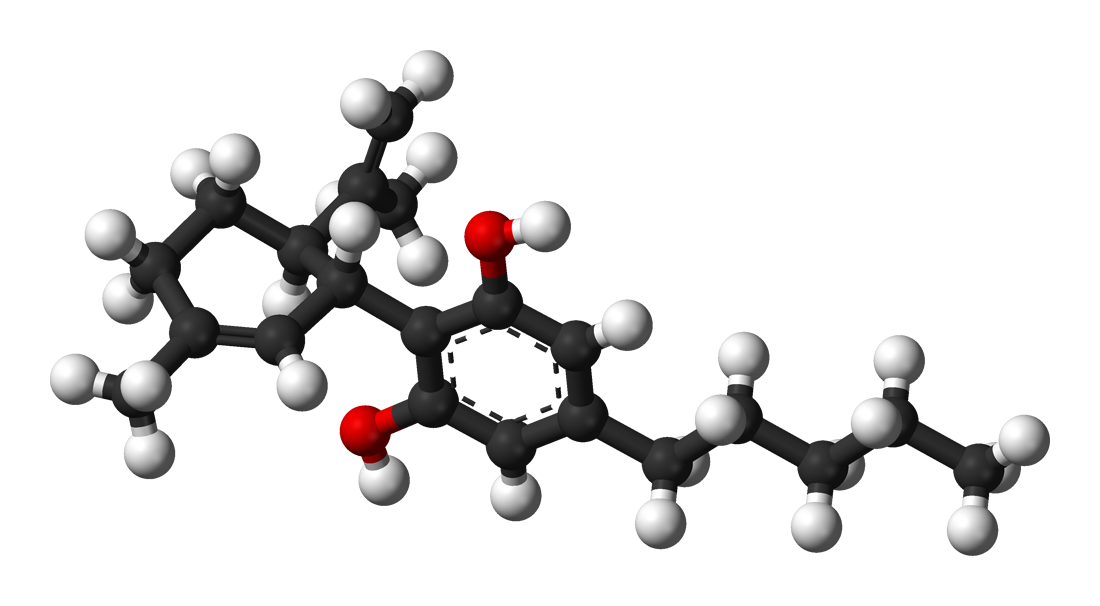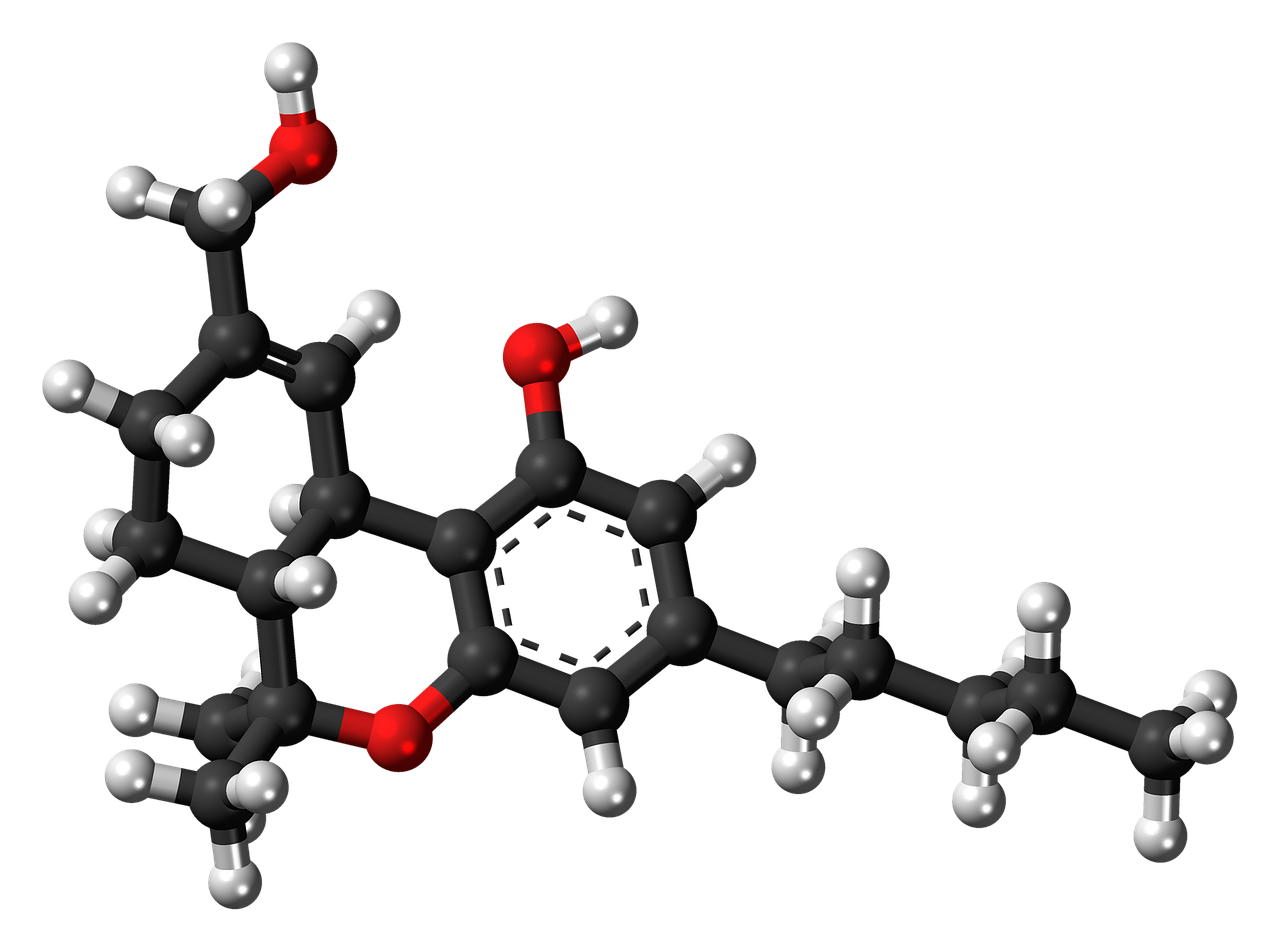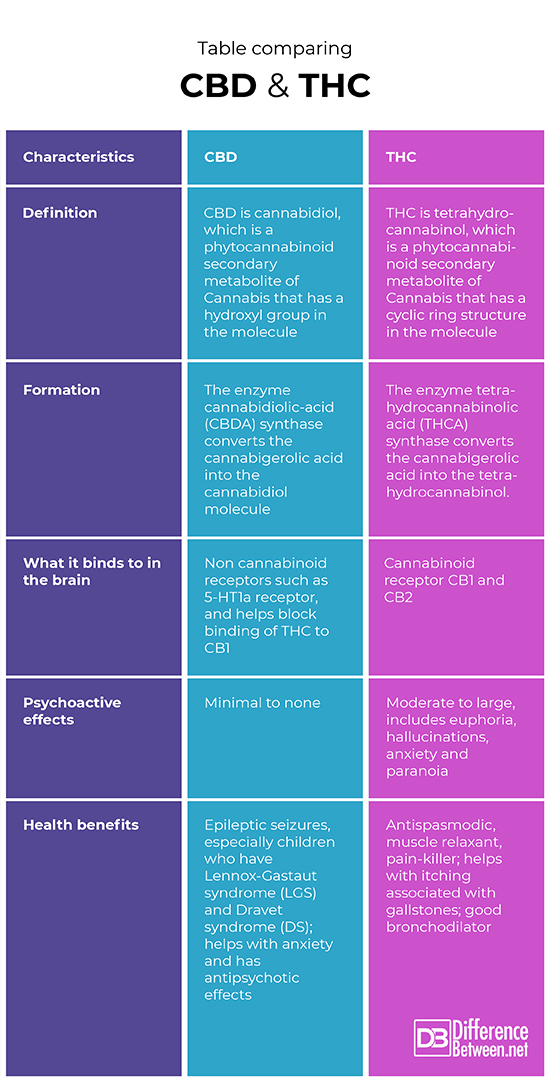Difference Between CBD and THC
CBD is a cannabinoid found in Cannabis that has a hydroxyl group present and can’t make people “high”. THC is a cannabinoid found in Cannabis that has a cyclic ring present and can make people “high”.
What is CBD?
Definition of CBD:
CBD is a cannabidiol compound that is found in hemp and marijuana plants in the genus Cannabis. It has the chemical formula C21H30O2 and the molecular weight is 314.469 g/mol. The CBD is a phytocannabinoid that is a plant metabolite. The CBD molecular structure includes the presence of a hydroxyl group.
Formation of CBD:
The metabolic pathway for CBD synthesis involves cannabigerolic acid. The enzyme cannabidiolic-acid (CBDA) synthase helps catalyze the conversion of the cannabigerolic acid into the cannabidiol molecule.
What it binds to in the brain:
CBD does not directly bind to the CB1 receptor in the brain and has the effect of blocking the binding of THC to this receptor to some extent. The CBD works as an antagonist against THC at this receptor. It does bind to the 5-HT1a receptor in the brain, which is a G protein-coupled type of receptor.
Psychoactive effects:
The CBD does not have a psychoactive impact on the brain, and therefore it does not make a person “high”. It does not cause paranoia or hallucinations unlike some substances that are found in Cannabis plants. Since it interferes with the binding of THC to CB1, it helps to reduce the psychoactive effect of the THC.
Health benefits:
There is evidence from research studies that CBD is of help to people who suffer from epilepsy. This is because the CBD has an anticonvulsant effect which helps to stop the seizures from occurring. This is especially useful for children who have Lennox-Gastaut syndrome (LGS) and Dravet syndrome (DS), which are seizure disorders that are particularly severe and often do not respond well to the usual treatment methods. The CBD has also been shown to have an antipsychotic effect, which means that it could be helpful in treating schizophrenia. Some limited evidence suggests that it also helps with the cognitive function of people who are schizophrenic. CBD also helps with anxiety and has been shown to be of benefit in individuals who have social anxiety disorder.
What is THC?
Definition of THC:
The THC is tetrahydrocannabinol is a phytocannabinoid produced in plants of the Cannabis genus. It has the same chemical formula C21H30O2 and molecular weight is 314.469 g/mol, as CBD. However, the molecular structure of THC includes the presence of a cyclic ring.
Formation of THC:
The metabolic pathway for THC synthesis also involves cannabigerolic acid. The enzyme tetrahydrocannabinolic acid (THCA) synthase helps catalyze the conversion of the cannabigerolic acid into the tetrahydrocannabinol.
What it binds to in the brain:
The THC does bind to the CB1 cannabinoid receptor of the peripheral and central nervous system. It is this binding affinity of THC for this receptor that leads to the psychoactive effects of the THC. It also binds to another receptor, the CB2 receptor of nerve cells.
Psychoactive effects:
THC has a definite psychoactive impact on the brain, and the extent of this depends on the concentration of the drug a person takes. It can cause a person to feel “high”, to have a sense of euphoria. The problem is that it can cause individuals to feel paranoid and may cause hallucinations. There is also evidence it can impair the learning ability if taken during adolescence.
Health benefits:
The THC molecule does have some benefits for health. The chemical has been found to have antispasmodic and pain-killing qualities. It also has antioxidant abilities and helps to relax muscles. People who have itching from jaundice due to gallstones have also reported some relief from taking in THC. In addition, THC has been shown to help dilate the bronchial tubes.
Difference between CBD and THC
-
Definition of CBD Vs. THC
CBD is cannabidiol of Cannabis that has a hydroxyl group in the molecule. THC is tetrahydrocannabinol of Cannabis that has a cyclic ring in the molecule.
-
Formation of CBD Vs. THC
The CBD is formed from cannabigerolic acid by the enzyme cannabidiolic-acid (CBDA) synthase. The THC is formed from cannabigerolic acid by the enzyme tetrahydrocannabinolic acid (THCA) synthase.
- What it binds to in the brain
CBD binds to some non cannabinoid receptors such as 5-HT1a receptor, and it also helps to block the binding of THC to CB1. THC binds to the cannabinoid receptors CB1 and CB2.
-
Psychoactive effects
The CBD has very little to no psychoactive effects. The THC does have moderate to large psychoactive effects on the brain because it binds to CB1. Effects of THC can include giving a person a feeling of euphoria, hallucinations, paranoia and anxiety.
-
Health benefits
CBD is known to have health benefits including helping children who have epilepsy, who have Lennox-Gastaut syndrome (LGS) and Dravet syndrome (DS); and it helps with anxiety and psychosis. THC also has health benefits and has been found to help with bronchodilation, with itching, and is useful as a muscle relaxant, antispasmodic and analgesic.
Table comparing CBD and THC
Summary of CBD Vs. THC
- The CBD and THC are both phytocannabinoids that are found in Cannabis plants, and they have the same molecular formula but slightly different atomic arrangements.
- The THC and CBD also bind to different receptors and have different effects on the body.
- CBD does not have psychoactive effects and helps stop the effect of THC by blocking the binding of THC to CB1.
- THC is the chemical that causes people to become “high” but it does have some healthy benefits.
- Difference Between Rumination and Regurgitation - June 13, 2024
- Difference Between Pyelectasis and Hydronephrosis - June 4, 2024
- Difference Between Cellulitis and Erysipelas - June 1, 2024
Search DifferenceBetween.net :
1 Comment
Leave a Response
References :
[0]Image credit: https://en.wikipedia.org/wiki/File:CBD-3D-balls.png
[1]Image credit: https://pixabay.com/en/tetrahydrocannabinol-metabolite-835852/
[2]Jurkus, Regimantas, et al. "Cannabidiol regulation of learned fear: implications for treating anxiety-related disorders." Frontiers in pharmacology 7 (2016): 454.
[3]Mechoulam, Raphael, and Lumı́r Hanuš. "Cannabidiol: an overview of some chemical and pharmacological aspects. Part I: chemical aspects." Chemistry and physics of lipids 121.1-2 (2002): 35-43.
[4]Russo, Ethan B. "Taming THC: potential cannabis synergy and phytocannabinoid‐terpenoid entourage effects." British Journal of Pharmacology163.7 (2011): 1344-1364.




If you are looking for a best and high maintenance but not too expensive strains. I recommend you blimburnseeds. I already purchased GRIZZLY PURPLE KUSH and It’s strong and heavy taste, with sweet and flowery aroma and a very high THC level usually lasts about an hour or two, depending on the drying and curing process. There are many types of Kush. Grizzly Purple Kush is one of the most powerful strains of marijuana. Grizzly Purple Kush is versatile, performing well for both indoor and outdoor. It works very well in screen of green or sea of green setups. It’s well known for its powerful, relaxing effect, used for relief for medical cannabis users in case of stress, severe pain or sleep loss.